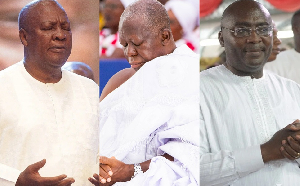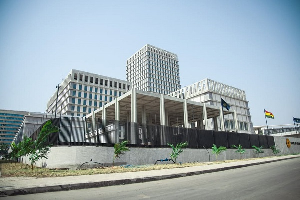On the face of it, democracy is a very simple system of government to operate. Registered voters line up at polling stations. They are given ballot papers on which they select their preferred candidates. They put the ballots into a box and then leave.
A few hours later, the votes are counted. And the candidates who get a majority of the counted votes are declared elected. Simple as ABC, isn't it? This system was first used in Ghana in the February 1951 general election.
That is, my dear reader, sixty-five, repeat sixty-five years ago.` And yet, so dead-brained do our officials we seem to be that after all the experience we have had with the system, we have not managed to learn from the inevitable mistakes we encountered with it in the past, but CONTINUE to make such mistakes.
For distressing reports have emanated from the stations at which “The Limited Registration” exercise, meant to put young people who have turned 18 since the last registration exercise, as well as those who could not register during the last exercise [in 2014] on the electoral roll.
First, there were reports that some parties were importing foreigners from neighbouring countries to come and register in Ghana so that they can vote in the Ghana elections of November 2016. There were denials that this was happening. But no-one believed the denials.
It was also widely reported that “minors” – that is, people who have still not reached the voting age – were being presented for registration. Apparently, to disprove that these people attempting to get on the register are “minors”, people claiming to be “guarantors” have been allowed at polling stations, ostensibly to “guarantee” that people whom the electoral officials suspected to be unqualified, were actually qualified and should be registered.
Whoever allowed this “guarantor” system to affect decisions at the registration centres must have his/her head examined. For it was actually inviting chaos! Who does not know that Ghanaians tend to be disorderly at public events?
Ask them to form a queue and they will quarrel about who came before another and who should, therefore, take precedence over the other. Be it at a football match, or a dance, some people will exhibit the undesirable human trait of wishing to be treated with greater favour than others. Which incites other humans to protest against the “favourable treatment” allegedly accorded to those who jump the queue.
Everyone who lives in Ghana is witness to the fact that political tension has risen to enormous proportions because a lot of people are acutely aware now that the country's coffers are being used to benefit a few individuals who have access to government contracts. These people want to stop the “stealing” by voting out the government in power.
Others, on the other hand, see their privileges as people with connections to the government being attacked, with a view to stopping them receiving such privileges altogether.
Both perceptions lead to what we in Ghana call “reddened eyes”. And when Ghanaians exhibit “reddened eyes”, it is wise to take notice and try to diffuse the situation that has given rise to their anger.
The staff of the Electoral Commission lives in this country and unless they have covered their eyes with blindfolds, they ought to be fully aware of the emotional political situation that currently exists in the country.
And they should, as people specially trained to take charge of elections have devised fool-proof systems that prevent cheating from taking place and which would reassure the public that everything is fine.
One of the most dangerous things the Electoral commission has done, with regard to the Limited Registration exercise, appears to be its decision to allow these “guarantors” to vouch for people who want to be registered.
For who is a “guarantor”? Who can ascertain that such a person's identity papers – or whatever – are not themselves forged documents? Is that not an initial point of contention?
If someone suspects that a so-called “guarantor” is not qualified to be one and yet a registration officer is accepting his/her credentials, what will the person think? He will suspect something and raise objections, of course, and in the most vociferous manner possible. Which, of course, creates an atmosphere of chaos, as other people try, in their turn, to shout the “impostor” down.
For, in a public place, if the seeds for grabbing power unfairly are being shown, there can never be a limited dispute. Everyone supposes that his/her interests will be directly affected by what's going on. So whenever a dispute arises, everyone jumps in, to make their “input”. Not necessarily by voice alone.
Hence, it was that over the past week, we have read such unsavoury headlines as “chaos at registration centres”; “cutlasses and cudgels wielded at registration centres”; and so on.
How do such headlines make the members of the Electoral Commission feel? We have been seeing disputes of all sorts at registration centres for sixty-five solid years. Human nature being what it is, it would be unrealistic to expect that such disputes would no longer arise. Or that they would not, in some cases, lead to violence.
What is important is that systems are evolved that can short-circuit, if not eliminate such disputes. If there had been such a system in place, we would not have heard about the chaos that was heralded by the headlines.
Now, it would be dishonest to apportion blame to any particular party for this state of affairs. For it can be assumed that everyone who takes part in political activity wants to win. And that in trying to win, some people will try to use deceit and/or force, to try and get their way.
It is the duty and sole responsibility of the Electoral Commission to expect this to happen and to take steps in advance to try and forestall its happening.
Did the Electoral Commission meet this responsibility? For an answer to that read what an organisation that monitored the registration has had to say about the performance of the Electoral Commission: the Coalition of Domestic Election Observers (CODEO) has urged security agencies in the country to deal with anyone who engages in “registration criminal offence”.
According to CODEO, the security agencies did their best in quelling the chaos and skirmishes which characterised the first phase of the Electoral Commission's Limited voter registration exercise.
Based on reports from CODEO observers stationed in registration centres across the country, the coalition said it had noted disturbing developments at some registration centers, which could mar the integrity of the registration exercise if left unchecked.
A CODEO Situational Report said it was important for the security agencies to intensify their surveillance of registration centres, especially those with a history of violence.
Touching on some of the incidents, CODEO said it observed that some persons wielding "cutlasses, stones, cudgels and other offensive weapons” wounded one person at the Kukuom-Achiase Registration Centre in the Asunafo North District of the Brong Ahafo Region.
It explained that the incident started with verbal exchanges between the District Chief Executive for the area (who happened to be at the centre) and the NPP agents posted at the same centre over the age of a registration applicant.
The report also said that “unauthorised party supporters and members of the public” loitered around registration centres in different parts of the country” to serve as guarantors for registrants who share their party affinity.
CODEO observed that many of the things which took place at some of the registration centres could have been avoided had political parties and the public obeyed the law governing the exercise.
It called on the Electoral Commission (EC) to monitor its team of registration officials to ensure that their conduct does not foment trouble at various centres. The pockets of violence and disturbances during the exercise could mar the integrity of the registration exercise if left unchecked, CODEO said.
The CODEO Report also made a case for the EC to increase the supply of registration centres in densely populated areas of the country, as the inadequacy of registration centers had prevented some potentially eligible persons from being able to register.
CODEO also reported instances where Registration Officials had allowed people to endorse guarantor forms early in the morning, had then departed from the centre, only for these forms to be subsequently used to support the registration of applicants who had turned up later.
CODEO observers also reported seeing unauthorised party supporters and members of the public loitering around registration centres in different parts of the country.
Some of them had closely positioned themselves around registration centres, “with the sole purpose of serving as guarantors” for registrants who shared party affinity. CODEO deserves congratulations on these warnings it has clear issues. Have they come too late, though?
The Electoral Commission would also do well to study the candid and detailed testimony of a Ghanaian who tried to register,
Opinions of Friday, 13 May 2016
Columnist: Cameron Duodu















